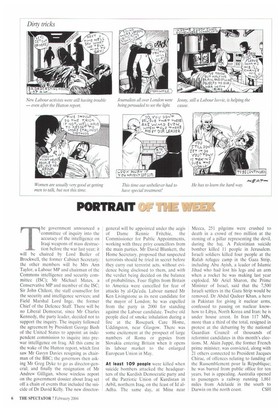PORTRAIT iiekrT'i ' T he government announced a committee of inquiry into
the accuracy of the intelligence on Iraqi weapons of mass destruction before the war last year; it will be chaired by Lord Butler of Brockwell, the former Cabinet Secretary; the other members will be Mrs Ann Taylor, a Labour MP and chairman of the Commons intelligence and security committee (ISC); Mr Michael Mates, a Conservative MP and member of the ISC; Sir John Chilcot, the staff counsellor for the security and intelligence services; and Field Marshal Lord Inge, the former Chief of the Defence Staff. There will be no Liberal Democrat, since Mr Charles Kennedy, the party leader, decided not to support the inquiry. The inquiry followed the agreement by President George Bush of the United States to appoint an independent commission to inquire into prewar intelligence on Iraq. All this came in the wake of the Hutton report, which first saw Mr Gmyn Davies resigning as chairman of the BBC; the governors then asking Mr Greg Dyke to go as director-general; and finally the resignation of Mr Andrew Gilligan, whose wireless report on the government dossier about Iraq set off a chain of events that included the suicide of Dr David Kelly. The new director
general will be appointed under the aegis of Dame Rennie Fritchie, the Commissioner for Public Appointments, working with three privy councillors from the main parties. Mr David Blunkett, the Home Secretary, proposed that suspected terrorists should be tried in secret before they carry out terrorist acts, without evidence being disclosed to them, and with the verdict being decided on the balance of probabilities. Four flights from Britain to America were cancelled for fear of attacks by al-Qa'eda. Labour named Mr Ken Livingstone as its next candidate for the mayor of London; he was expelled from the party in 2000 for standing against the Labour candidate. Twelve old people died of smoke inhalation during a fire at the Rosepark Care Home, Uddingston, near Glasgow. There was some excitement at the prospect of large numbers of Roma or gypsies from Slovakia entering Britain when it opens its labour market to the enlarged European Union in May.
At least 109 people were killed when suicide bombers attacked the headquarters of the Kurdish Democratic party and of the Patriotic Union of Kurdistan in Arbil, northern Iraq, on the feast of Id alAdha. The same day, at Mina near Mecca, 251 pilgrims were crushed to death in a crowd of two million at the stoning of a pillar representing the devil, during the haj. A Palestinian suicide bomber killed 11 people in Jerusalem. Israeli soldiers killed four people at the Rafah refugee camp in the Gaza Strip, including Abu Ayish, a leader of Islamic Jihad who had lost his legs and an arm when a rocket he was making last year exploded. Mr Arid l Sharon, the Prime Minister of Israel, said that the 7,500 Israeli settlers in the Gaza Strip would be removed. Dr Abdul Qadeer Khan, a hero in Pakistan for giving it nuclear arms, confessed to passing on nuclear knowhow to Libya, North Korea and Iran; he is under house arrest. In Iran 117 MPs, more than a third of the total, resigned in protest at the debarring by the national Guardian Council of thousands of reformist candidates in this month's elections. M. Alain Juppe, the former French prime minister, was convicted, along with 21 others connected to President Jacques Chirac, of offences relating to funding of the Rassemblement pour la Republique; he was barred from public office for ten years, but is appealing. Australia opened to passengers a railway running 1,861 miles from Adelaide in the south to
Darwin on the north coast. CSH


























































 Previous page
Previous page